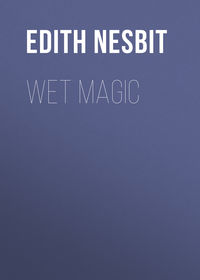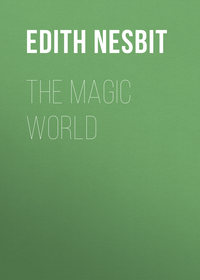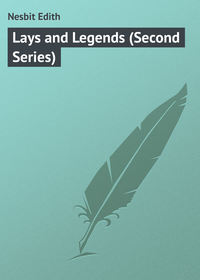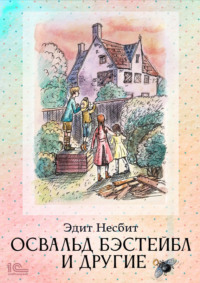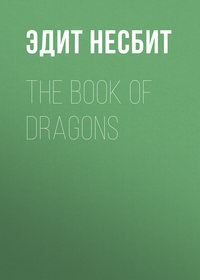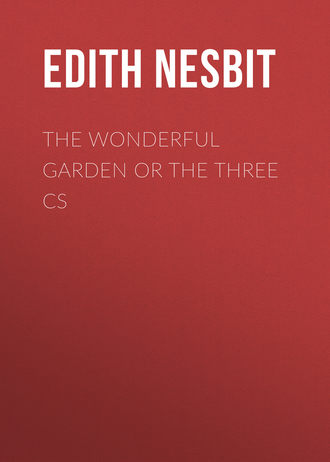 полная версия
полная версияThe Wonderful Garden or The Three Cs
She was looking out of the bow window of the big room spread with a blue rose-patterned carpet, at the green glory of the park, lying in the sun like another and much more beautiful carpet with a pattern of trees on it.
Then they went down to tea. Such a house – full of beautiful things! But the children hadn’t time to look at them then, and I haven’t time to tell you about them now.
I will only say that the dining-room was perfect in its Turkey-carpet-and-mahogany comfort, and that it had red curtains.
‘Will you please pour the tea, Miss Caroline?’ said Mrs. Wilmington, and went away.
‘I’m glad we haven’t got to have tea with her, anyway,’ said Charles.
And then Uncle Charles came in. He was not at all what they expected. He could not have been what anybody expected. He was more shadowy than you would think anybody could be. He was more like a lightly printed photograph from an insufficiently exposed and imperfectly developed negative than anything else I can think of. He was as thin and pale as Mrs. Wilmington, but there was nothing hard or bony about him. He was soft as a shadow – his voice, his hand, his eyes.
‘And what are your names?’ he said, when he had shaken hands all round.
Caroline told him, and Charles added:
‘How funny of you not to know, uncle, when we’re all named after you!’
‘Caroline, Charles, Charlotte,’ he repeated. ‘Yes, I suppose you are. I like my tea very weak, please, with plenty of milk and no sugar.’
Caroline nervously clattered among the silver and china. She was not used to pouring out real tea for long-estranged uncles.
‘I hope you will enjoy yourselves here,’ said Uncle Charles, taking his cup; ‘and excuse me if I do not always join you at meals. I am engaged on a work – I mean I am writing a book,’ he told them.
‘What fun!’ said every one but Caroline, who had just burnt herself with the urn; and Charles added:
‘What’s it about?’
‘Magic,’ said the Uncle, ‘or, rather, a branch of magic. I thought of calling it “A Brief Consideration of the Psychological and Physiological Part played by Suggestion in So-called Magic.”’
‘It sounds interesting; at least I know it would if I knew anything about it,’ said Caroline, trying to be both truthful and polite.
‘It’s very long,’ said Charles. ‘How would you get all that printed on the book’s back?’
‘And don’t say “so-called,”’ said Charlotte. ‘It looks as if you didn’t believe in magic.’
‘If people thought I believed in magic they wouldn’t read my books,’ said Uncle Charles. ‘They’d think I was mad, you know.’
‘But why?’ Charlotte asked. ‘We aren’t mad, and we believe in it. Do you know any spells, uncle? We want awfully to try a spell. It’s the dream of our life. It is, really.’
The ghost of a smile moved the oyster-shell-coloured face of Uncle Charles.
‘So you take an interest in magic?’ he said. ‘We shall have at least that in common.’
‘Of course we do. Every one does, only they’re afraid to say so. Even servants do. They tell fortunes and dreams. Did you ever read about the Amulet, or the Phœnix, or the Words of Power? Bread and butter, please,’ said Charles.
‘You have evidently got up the subject,’ said Uncle Charles. ‘Who told you about Words of Power?’
‘It’s in The Amulet,’ said Charlotte. ‘I say, uncle, do tell us some spells.’
‘Ah!’ Uncle Charles sighed. ‘I am afraid the day of spells has gone by – except, perhaps, for people of your age. She could have told you spells enough – if all the stories of her are true.’
He pointed to a picture over the mantelpiece – a fair-haired, dark-eyed lady in a ruff.
‘She was an ancestress of ours,’ he said; ‘she was wonderfully learned.’
‘What became of her?’ Charlotte asked.
‘They burned her for a witch. It is sometimes a mistake to know too much,’ said the Uncle.
This contrasted agreeably with remembered remarks of Uncle Percival and Aunt Emmeline, such as ‘Knowledge is power’ and ‘There is no darkness but ignorance.’
The children looked at the lady in the white ruff and black velvet dress, and they liked her face.
‘What a shame!’ they said.
‘Yes,’ said the Uncle. ‘You see she’s resting her hand on two books. There’s a tradition that those books contain her magic secret. I used to look for the books when I was young, but I never found them – I never found them.’ He sighed again.
‘We’ll look, uncle,’ said Charlotte eagerly. ‘We may look, mayn’t we? Young heads are better than old shoulders, aren’t they? At least, that sounds rude, but you know I mean two heads are better than yours – No, that’s not it. Too many cooks spoil the – No, that’s not it either. We wouldn’t spoil anything. Too many hands make light work. That’s what I meant.’
‘Your meaning was plain from the first,’ said the Uncle, finishing his tea and setting down his cup – a beautiful red and blue and gold one – very different from Aunt Emmeline’s white crockery. ‘Certainly you may look. But you’ll respect the field of your search.’
‘Uncle,’ said Caroline, from behind the silver tea-tray, ‘your house is the most lovely, splendid, glorious, beautiful house we’ve ever seen, and – ’
‘We wouldn’t hurt a hair of its head,’ said Charles.
Again the Uncle smiled. ‘Well, well,’ he said, and faded away like a shadow.
‘We’ll find those books or perish,’ said Charlotte firmly.
‘Ra-ther,’ said Charles.
‘We’ll look for them, anyway,’ said Caroline. ‘Now let’s go and pick an ivy leaf and put it in a letter for poor dear Aunt Emmeline. I’ll tell you something.’
‘Well?’ said the others.
‘This is the sort of house I’ve always dreamed of when it said luxury – in books, you know.’
‘Me too,’ said Charlotte.
‘And me,’ said Charles.
CHAPTER III
THE WONDERFUL GARDEN
It was very glorious to wake up the next morning in enormous soft beds – four-posted, with many-folded silk hangings, and shiny furniture that reflected the sunlight as dark mirrors might do. And breakfast was nice, with different sorts of things to eat, in silver dishes with spirit-lamps under them, – bacon and sausages and scrambled eggs, and as much toast and marmalade as you wanted; not just porridge and apples, as at Aunt Emmeline’s. There were tea and coffee and hot milk. They all chose hot milk.
‘I feel,’ said Caroline, pouring it out of a big silver jug with little bits of ivory between the handle and the jug to keep the handle from getting too hot, ‘I feel that we’re going to enjoy every second of the time we’re here.’
‘Rather,’ said Charles, through sausage. ‘Isn’t Uncle Charles a dear,’ he added more distinctly. ‘I dreamed about him last night – that he painted his face out of the paint-box I gave Caro, and then we blew him out with the bellows to make him fatter.’
‘And did it?’ Caroline asked.
‘He burst,’ said Charles briefly, ‘and turned into showers of dead leaves.’
There was an interval of contented silence. Then —
‘What shall we do first?’ said Charles. And his sisters with one voice answered, ‘Explore, of course.’
And they finished their breakfast to dreams of exploring every hole and corner of the wonderful house.
But when they rang to have breakfast taken away it was Mrs. Wilmington who appeared.
‘Your uncle desired me to say that he thinks it’s healthy for you to spend some hours in the hopen —open air,’ she said, speaking in a small distinct voice. ‘He himself takes the air of an afternoon. So will you please all go out at once,’ she ended in a burst of naturalness, ‘and not come ’ome, home, till one o’clock.’
‘Where are we to go?’ asked Charlotte, not pleased.
‘Not beyond the park and grounds,’ said the housekeeper. ‘And,’ she added reluctantly, ‘Mr. Charles said if there was any pudding you liked to mention – ’
A brief consultation ended in, ‘Treacle hat, please’; and when Mrs. Wilmington had minced off, they turned to each other and said:
‘The brick!’
‘The old duck!’ and
‘Something like an uncle.’
Then they went out, as they had been told to do. And they took off their shoes and stockings, which they had not been told to do – but, on the other hand, had not been told not to – and walked barefooted in the grass still cool and dewy under the trees. And they put on their boots again and explored the park, and explored the stable-yard, where a groom was rubbing bright the silver buckles of the harness and whistling as he rubbed. They explored the stables and the harness-room and the straw-loft and the hay-loft. And then they went back to the park and climbed trees – a little way, because though they had always known that they would climb trees if ever they had half a chance, they had not, till now, had any chance at all.
And all the while they were doing all this they were looking – at the back of their minds, even when they weren’t doing it with the part you think with – for the garden.
And there wasn’t any garden!
That was the plain fact that they had to face after two hours of sunshine and green out-of-doors.
‘And I’m certain mother said there was a garden,’ Caroline said, sitting down suddenly on the grass; ‘a beautiful garden and a terrace.’
‘Perhaps the Uncle didn’t like it, and he’s had it made not garden again – “Going back to Nature” that would be, like Aunt Emmeline talks about,’ Charles suggested.
‘And it’s dreadful if there’s no garden,’ said Caroline, ‘because of the flowers we were going to send in letters. Wild flowers don’t have such deep meanings, I’m certain.’
‘And besides we haven’t seen any wild flowers,’ said Caroline. ‘Oh, bother!’
‘Never mind,’ Charles said, ‘think of exploring the house – and finding the book, perhaps. We’ll ask the Elegant One, when we go in, why there isn’t a garden.’
‘We won’t wait till then,’ said Charlotte; ‘let’s go and ask that jolly man who’s polishing the harness. He looked as if he wouldn’t mind us talking to him.’
‘It was him drove us yesterday,’ Charles pointed out.
So they went as to an old friend. And when they asked William why there wasn’t a garden he answered surprisingly and rather indignantly:
‘Ain’t they shown you, Miss? Not a garden? There ain’t a garden to beat it hereabouts. Come on, I’ll show you.’
And, still more surprisingly, he led the way to the back door.
‘We aren’t to go indoors till dinner-time,’ said Caroline; ‘and besides, we should like to see the garden – if there really is one.’
‘Of course there is one, Miss,’ said William. ‘She’ll never see you if you’re quick. She’ll be in her room by now – at her accounts and things. And the Master’s never about in these back parts in the morning.’
‘I suppose it’s a lock-up garden and he’s going to get the key,’ said Charles in a whisper. But William wasn’t.
He led them into a whitewashed passage that had cupboards and larders opening out of it and ended in a green baize door. He opened this, and there they were in the hall.
‘Quick,’ he said, and crossed it, unlatched another door and held it open. ‘Come in quiet,’ he said, and closed the door again. And there they all were in a little square room with a stone staircase going down the very middle of it, like a well. There was a wooden railing round three sides of the stairway, and nothing else in the room at all, except William and the children.
‘A secret staircase,’ said Charlotte. ‘Oh, it can’t be, really. How lovely!’
‘I daresay it was a secret once,’ said William, striking a match and lighting a candle that stood at the top of the stairs in a brass candlestick. ‘You see there wasn’t always these banisters, and you can see that ridge along the wall. My grandfather says it used to be boarded over and that’s where the joists went. They’d have a trap-door or something over the stairway, I shouldn’t be surprised.’
‘But what’s the stair for? – Where does it go? Are we going down?’ the children asked.
‘Yes, and sharp too. Nobody’s supposed to go this way except the Master. But you’ll not tell on me. I’ll go first. Mind the steps, Miss. They’re a bit wore at the edges, like.’
They minded the steps, going carefully down, following the blinking, winking, blue and yellow gleam of the candle.
There were not many steps.
‘Straight ahead now,’ said William, holding the candle up to show the groined roof of a long straight passage, built of stone, and with stone flags for the floor of it.
‘How perfectly ripping!’ said Charlotte breathlessly. ‘It is brickish of you to bring us here. Where does it go to?’
‘You wait a bit,’ said William, and went on. The passage ended in another flight of steps – up this time, – and the steps ended in a door, and when William had opened this every one blinked and shut their eyes, for the doorway framed green leaves with blue sky showing through them, and —
‘’Ere’s the garden,’ said William; and here, indeed, it was.
‘There’s another door the other end what the gardeners go in and out of,’ said William. ‘I’ll get you a key sometime.’
The door had opened into a sort of arch – an arbour, for its entrance was almost veiled by thick-growing shrubs.
‘Oh, thank you,’ said Caroline; ‘but when did they make this passage, and what for?’
‘They made that passage when the folks in the house was too grand to go through the stable-yard and too lazy to go round,’ said William. ‘There’s no stable-yard way now,’ he added. ‘So long! I must be getting back, Miss. Don’t you let on as I brought you through.’
‘Of course not,’ every one said. Charles added, ‘But I didn’t know the house was as old as secret passages in history times.’
‘It’s any age you please,’ said William; ‘the back parts is.’
He went back through the door, and the children went out through the leafy screen in front, into the most beautiful garden that could be, with a wall. I like unwalled gardens myself, with views from the terraces. From this garden you could see nothing but tall trees and – the garden itself.
The lower half was a vegetable garden arranged in squares with dwarf fruit-trees and flower-borders round them, like the borders round old-fashioned pocket-handkerchiefs. Then about half-way up the garden came steps – stone balustrades, a terrace, and beyond that a flower garden with smooth green turf paths, box-edged, a sundial in the middle, and in the flower-beds flowers – more flowers than I could give names to.
‘How perfectly perfect!’ Charlotte said.
‘I do wish I’d brought out my Language Of!’ said Caroline.
‘How awfully tidy everything is!’ said Charles in awe-struck tones.
It was.
There was nowhere an imperfect leaf, a deformed bud, or a misshapen flower. Every plant grew straight and strong, and with an extraordinary evenness.
‘They look like pictures of plants more than like real ones,’ said Caroline quite truly.
An old gardener was sweeping the terrace steps, and gave the children ‘Good morning.’
They gave it back, and stayed to watch him. It seemed polite to say something before turning away. So Caroline said:
‘How beautifully everything grows here.’
‘Ay,’ said the old man, ‘it do. Say perfect and you won’t be far out.’
‘It’s very clever of you,’ said Charlotte. ‘Ill weeds don’t grow in a single place in your garden.’
‘I don’t say as I don’t do something,’ said the old man, ‘but seems as if there was a blessing on the place – everything thrives and grows just-so. It’s the soil or the aspick, p’raps. I dunno. An’ I’ve noticed things.’
‘What things?’ was the natural question.
‘Oh, just things,’ the gardener answered shortly, and swept away to the end of the long steps.
‘I say’ – Caroline went after him to do it – ‘I say, may we pick the flowers?’
‘In moderation,’ said the gardener, and went away.
‘I wonder what he’d call moderation,’ said Charles; and they discussed this question so earnestly that the dinner-bell rang before they had picked any flowers at all.
The gate at the end of the garden was open, and they went out that way. Over the gate was a stone with words and a date. They stopped to spell out the carved letters:
HERE BE DREAMES1589RESPICE FINEMCaroline copied the last two words in the grey-covered pocket-book; and when Mrs. Wilmington came in to carve the mutton, Caroline asked what the words meant.
‘I never inquired,’ said the housekeeper. ‘It must be quite out of date now, whatever it meant once. But you must have been in the garden to see that. How did you get in?’
An awkward question. There was nothing for it but to say:
‘By the secret passage.’ And Charles said it.
‘No one uses that but your uncle,’ said Mrs. Wilmington, ‘and you were requested to keep out of doors till dinner-time.’
She shut her mouth with a snap and went on carving.
‘Sorry,’ said Caroline.
‘Granted,’ said Mrs. Wilmington, but not cordially; and having placed two slices of mutton on each plate went away.
‘It is jolly having meals by ourselves,’ said Charlotte; ‘only I wish she wasn’t cross.’
‘We ought to be extra manner-y, I expect, when we’re by ourselves,’ said Caroline. ‘May I pass you the salt, Charles?’
‘No, you mayn’t,’ said Charles. ‘Thank you, I mean; but there’s one at each corner. That’s one each for us, and one over for – ’
‘For her.’ Charlotte pointed to the picture of the dark-eyed, fair-haired lady.
‘Let’s put a chair for her,’ said Charlotte, ‘and pretend she’s come to dinner. Then we shall have to behave like grown-up people.’
‘I never can remember about behaving,’ said Charles wearily; ‘such a lot of things – and none of them seem to matter. Why shouldn’t you drink with your mouth full? It’s your own mouth.’
‘And eating peas with your knife. I think it would be as good as conjuring, doing it without cutting yourself’ – Charlotte tried to lift the peas from her plate with her knife – ‘let alone the balancing,’ she added, as they rolled off among the mutton.
‘Don’t,’ said Caroline. ‘She’s looking at you. Charles, you’re the only gentleman, worse luck – I wish I was a boy – put a chair for her.’
And a large green-seated chair, whose mahogany back was inlaid with a brass scroll pattern, was wheeled to the empty space on the fourth side of the table.
‘Now we must none of us look at her – in the picture, I mean. And then we can’t be sure that she isn’t sitting in that chair,’ said Caroline.
After dinner Caroline looked up ‘Remorse’s regret’ in The Language of Flowers. It was agreed that Mrs. Wilmington had better have a bouquet.
‘Brambles,’ Caroline said, her finger in the book, ‘they’re Remorse – but they wouldn’t make a very comfortable nosegay. And Regret’s verbena, and I don’t even know what it is.’
‘Put pansies with the brambles,’ said Charlotte; ‘that’ll be thoughts of remorse.’
So the housekeeper, coming down very neat in her afternoon dress of shiny black alpaca, was met by a bunch of pansies.
‘To show we think we’re remorsish about the secret stairs,’ said Charlotte; ‘and look out, because the brambles are the remorse and they prick like Billy-o!’
Mrs. Wilmington smiled, and looked quite nice-looking.
‘Thank you,’ she said. ‘I am sure you will remember not to repeat the fault.’
Which wasn’t the nicest way of receiving a remorse bouquet; but, then as Charlotte said, perhaps she couldn’t help not knowing the nice ways. And anyhow, she seemed pleased, and that was the great thing, as Charlotte pointed out.
Then, having done something to please Mrs. Wilmington, they longed to do something to please some one else, and the Uncle was the only person they could think of doing anything to please.
‘Suppose we arranged all the books in the dining-room bookcase, in colours, – all the reds together and all the greens, and the ugly ones all on a shelf by themselves,’ Charlotte suggested. And the others agreed. So that the afternoon flew by like any old bird, as Caroline put it; and when tea came, and the floor and sofa and chairs were covered with books, and one shelf was gay with red books and half a shelf demure in green —
‘Your uncle isn’t coming in to-day,’ said Mrs. Wilmington, ‘and I’m sure it’s just as well. What a mess! Here, let me put them back, and go and wash your hands.’
‘We’ll put them back,’ the children said, but in vain. They had to go to wash their hands, and Mrs. Wilmington continued to put the books back all the time they were having tea. Patiently and carefully she did it, not regarding the colours at all, and her care and her patience seemed to say, more loudly than any words she could have spoken, ‘Yes; there you sit, having your nice tea, and I cannot have my tea, because I have to clear up after you. But I do not complain. No.’
They would have much rather she had complained, of course. But they couldn’t say so.
CHAPTER IV
IN THESSALONIANS
Now you may say it was Chance, or you may say it was Fate; or you may say it was Destiny, or Fortune; in fact, you may say exactly what you choose. But the fact remains unaltered by your remarks.
When Mrs. Wilmington placed a fat brown volume of sermons on the shelf and said, ‘There, that’s the last,’ she, quite without meaning it, said what was not true. For when tea was over the children found that the fat sermon-book had not been the last. The last was Shadoxhurst on Thessalonians, a dull, large book, and Mrs. Wilmington had not put it back in its place because she had not seen it. It was, in fact, lying on the floor, hidden by the table-cloth. If Charles had not happened to want his handkerchief, and gone down to look for it on the floor – its usual situation when it was needed – they would not have seen the book either.
Charles picked up Thessalonians, and the cover ‘came off in his hand,’ as the handles of cups do in the hands of washing-up maids.
What was inside the cover fell on the floor with a thump, and Caroline picked that up.
‘Shadoxhurst on Thessalonians,’ Charles read from the cover.
‘This isn’t,’ said Caroline, looking at what had been inside. ‘It’s – I say! Suppose it was the book – ’
She looked up at the picture.
It was certainly like the painted book.
‘Only it hasn’t any brass clasps,’ said Caroline; ‘but look – it used to have clasps. You can see the marks where they used to go.’
You could.
‘Glory!’ cried Charlotte. ‘Fancy finding it the very first day! Let’s take it to Uncle Charles.’
‘Perhaps it isn’t it,’ suggested Charlotte. ‘Then he’d be furious perhaps.’
‘We’ll soon see.’ Charles reached out a hand. ‘Let’s have a squint. It ought to be all magic and Abracadabra and crossed triangles like in Ingoldsby Legends.’
‘I’ll have first look any way,’ said Caroline. ‘I found it.’
‘I found it,’ said Charles. ‘You only picked it up.’
‘You only dropped it. Oh, bother– ’ she had opened the book, and now let her hands fall, still holding it.
‘Bother what?’ asked the others.
‘It isn’t English. It’s French or Latin or something. Isn’t that just like things! Here, you can look.’
Charles took the book. ‘It’s Latin,’ he said. ‘I could read it if I knew a little more Latin. I can read some of it as it is. I know quam, or apud, and rara. Let’s take it to the Uncle.’
‘Oh no,’ said Caroline. ‘Let’s find out what it is, first.’
It was not easy to find out. The title-page was missing, and quam, apud, and rara, though quite all right in their way, gave but little clue to what the book was about.
‘I wish we’d some one we could ask,’ said Charles. ‘I don’t suppose the Wilmington knows any Latin. I don’t suppose she knows even apud and quam and rara. If we had the Murdstone chap handy he could tell us, I suppose.’
‘I’m glad we haven’t,’ Charlotte said. ‘I don’t suppose he’d tell us. And he’d take it away. I say. I suppose there’s a church somewhere near. And a clergyman. He’d know.’
‘Of course he would,’ Caroline said with returning brightness. ‘Let’s go and ask him.’
Half an hour later the children, coming down a deep banked lane, saw before them the grey tower of the church, with elm-trees round it, standing among old gravestones and long grass.


